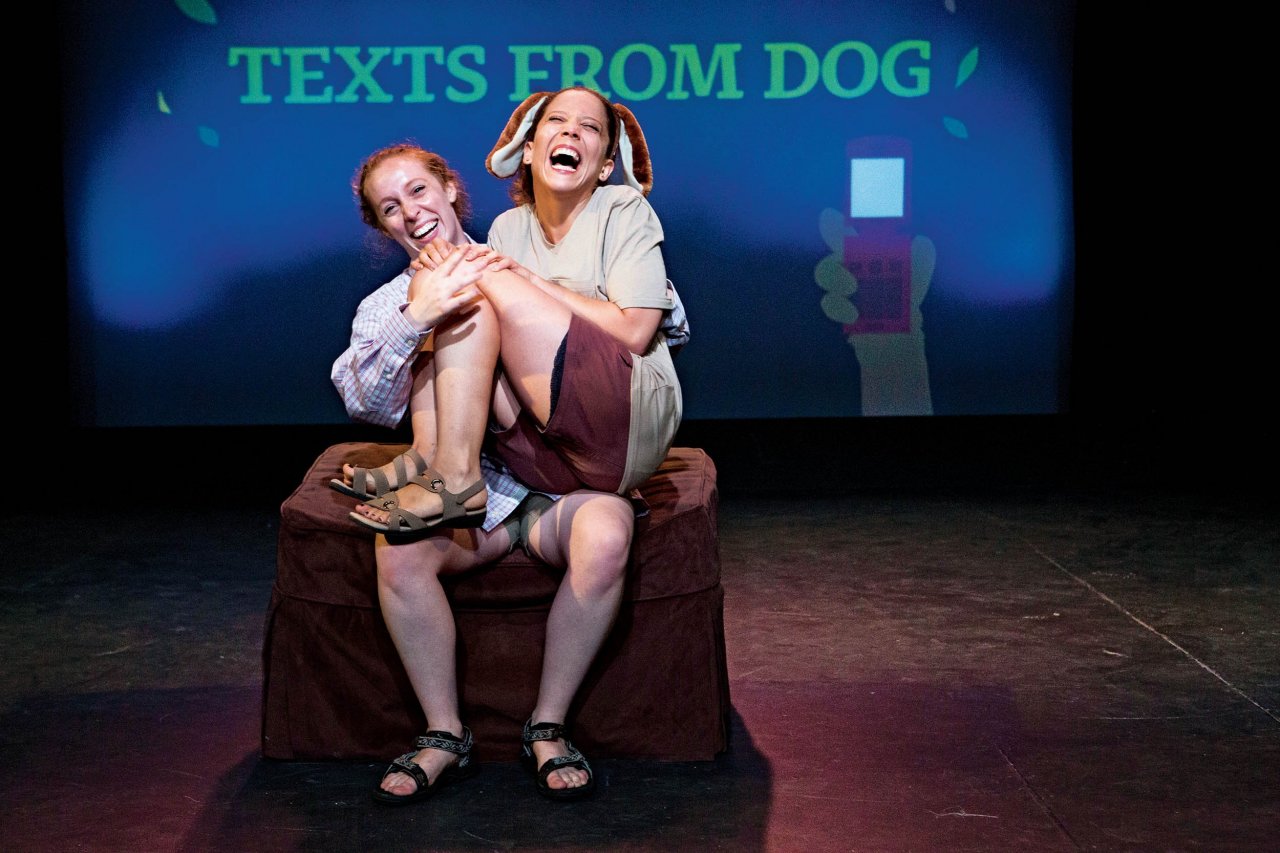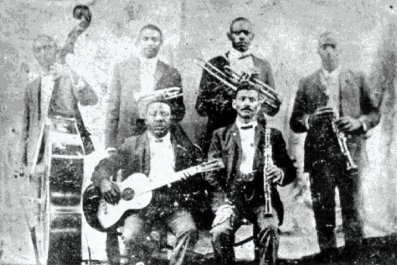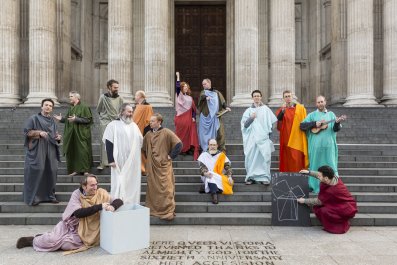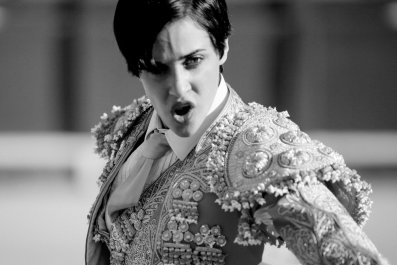On Friday and Saturday evenings, in a cramped Lower East Side performance space where board games seem to be more popular than cocktails, actresses Alli Goldberg, Jen Jamula and a small cast they've assembled perform the Internet.
Or part of it, at least. Which part? It varies. At a mid-November performance, the sketch comedy group known as Blogologues repurposed selections from such sources as Yahoo! Answers, Angelfire.com, and a once-ubiquitous Tumblr called "Fuck Yeah Chuck Norris." They dramatized tweets and, in spectacular fashion, acted out a Saved by the Bell recap. (Turns out Goldberg, decked in late '80s attire, looks quite a bit like Jessie Spano.) Another sketch brought to life every tenth-grade nerd's horror: being caught underwear shopping in front of a crush. You'd swear it was written for the stage, though in fact it appeared as an essay on The Hairpin in 2011.
The unifying quality, as a sign near the theater's entrance promised, is simple: "Every word the actors say tonight is word-for-word from the Internet." That's been the guiding philosophy behind Blogologues since Goldberg and Jamula founded the show in early 2011. The two met at Yale several years earlier, where Goldberg, a musical theater enthusiast, jokes that "when I met Jen she was a very serious actress, and I ruined her." They collaborated on some creative projects after college, and then one night found themselves reading a blog post aloud. "Alli said, 'Jen, I really think this blog could be a monologue' and I was just jokingly saying, 'It's a Blogologue!'" Jamula recalls. "So [we] said, 'Let's just book a theater and do this.'"
And so began a three-and-a-half-year run. Since then, Blogologues has shuffled through a handful of ensemble casts (primarily women, to offset the male-dominated comedy world) and rotated between a number of Internet-friendly themes. (This fall show was nostalgia-focused; the two founders Asked Jeeves and scoured blogs about "'90s problems" in search of ideas.) It's attracted a small audience of regulars, too, who are nicknamed "Blogosaurs" and awarded honorary bandanas for their service.
Found material from the web can take on new life when lifted from its natural habitat, and Blogologues is one of a handful of recent artistic endeavors to explore that impulse. The founders describe being intrigued by "Benjameme," a project in which artist Lauren Kaelin paints popular Internet memes, as well as Tail! Spin!, an Off-Broadway play composed of leaked emails, texts and tweets from political scandals.
Or consider Mark Slutsky, a Montreal filmmaker who scours YouTube comments in his spare time and compiles the most sentimental nuggets of nostalgia on a blog, Sad YouTube. The selections are taken from videos of old pop songs and tend to involve questionable grammar but genuine pathos, with lines like "my dADDY COULD REaly sing and i remember him singing to my mom and dancing with her miss you dad rip." "Conventional wisdom has it that the YouTube comment section is totally worthless and should be fixed or destroyed or something," Slutsky says. "But sometimes people would leave something there that was really interesting or touching or sad."
Slutsky has recited these YouTube excerpts aloud to audiences on several occasions. I watched one such performance at IRL Club, "an irregular series of talks about the Internet" hosted by ex-Gawker blogger Adrian Chen," last winter. The captive-audience effect was remarkable: you'd browse mindlessly past these hazy anecdotes every day on the Internet, but transported to a stage, they seemed funny and poignant and weirdly heartbreaking. "I'm a filmmaker when I'm not doing this, so I did think of them all as dialogue to be directed," Slutsky tells me.
So do the Blogologues team, though things have gotten more bizarre along the way. The idea is to "explore this concept of identity in the digital age," Goldberg says. "You read a text and think, 'Oh, this is a young girl in the Midwest, this is a mommy blogger, this is an old man.' We like to flip it on its head… so we really play with who these people could be." That means treating Internet content as literary texts to be interpreted and reinterpreted. In one show, the cast turned a McSweeney's list about "Dog Videos I'd Like To See on the Internet" into a couple livening up their relationship by indulging a dog fetish onstage.
Slutsky and Goldberg both seek a sort of poetry in the chaos of YouTube comments and Craigslist listings, so it seems fitting that actual poets have turned to similar digital ephemera for inspiration. The most famous of these is American poet Kenneth Goldsmith, who in 2013 organized an exhibition that attempted to print the entire Internet. Goldsmith more recently revealed that he would be teaching a University of Pennsylvania course called "Wasting Time on the Internet." That was not an empty boast; the professor told Newsweekthat he believes "the Internet is the greatest poem ever written."
Nearby in Philadelphia, a poet named Nicole Steinberg draws on similar—if more narrowly specified—inspiration: she titles her poems after think pieces she finds on the Internet. (Speaking recently with The New York Times, Steinberg defined the term thusly: "500-1,000 words sort of dithering about a certain topic, and trying to find an angle about any given thing that happens.")
"Something about the Internet translates so well to performance—maybe because it's a relatively private, intimate platform," Steinberg muses via email. "We say so many things on the Internet that we might never say out loud, which is what makes them so much fun to say out loud." In the past the poet has drawn on OKCupid profile questions, writing poems with titles like "You Should Message Me If" and "What I'm Doing With My Life." "It's not a new thing for poets to make use of found material," she adds, noting that the avant garde Flarf poetry movement, which sprung up around the turn of the millennium, has made use of online materials for years. "Everyone's lives unfold on the Internet now, from the stuff we post on social media to the comments we leave on BuzzFeed articles. So why wouldn't poets go there for inspiration?"
The counter-argument may be that the Internet is rife with hot garbage—toxic misogyny and racist tirades and general, scattered idiocy. But amidst the rubble, there might be something worth rescuing.
"When an archaeologist wants to learn something about a civilization, they go through the trash," Slutsky says. "That's how I feel about YouTube comments. They're sort of the trash of our culture." Someone has to dig through it all.




























